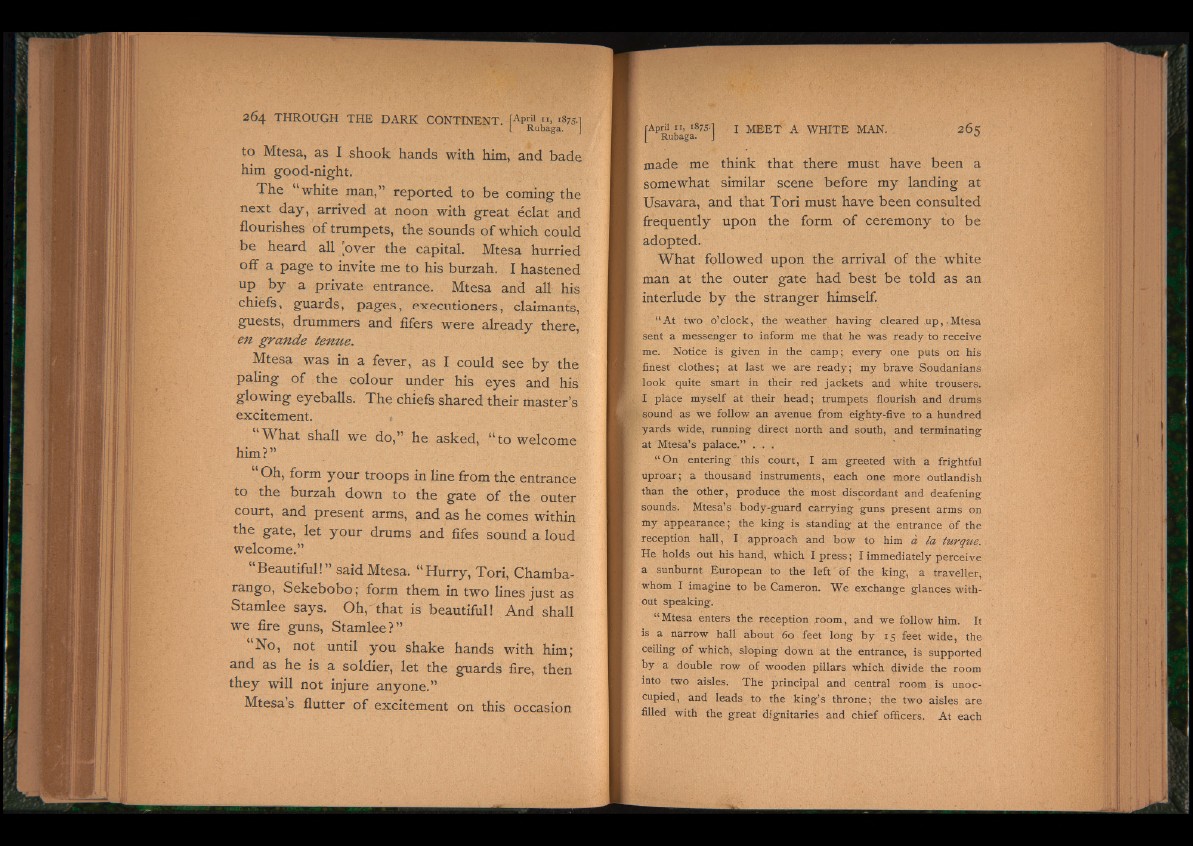
to Mtesa, as I shook hands with him, and bade
him good-night.
T he white man,” reported to be coming the
next day, arrived at noon with great éclat and
flourishes o f trumpets, the sounds o f which could
be heard all 'over the capital. Mtesa hurried
o ff a page to invite me to his burzah. I hastened
up b y a private entrance. Mtesa and all his
chiefs, guards, p a g e s , executioners, claimants,
guests, drummers and fifers were already there,
en grande tenue.
Mtesa was in a fever, as I could see b y the
paling o f the colour under his eyes and his
glowing eyeballs. T he chiefs shared their master’s
excitement. *
‘What shall we do,” he asked, “ to welcome
him?”
Oh, form your troops in line from the entrance
to the burzah down to the gate o f the outer
court, and present arms, and as he comes within
the gate, let yo u r drums and fifes sound a loud
welcome.”
“ Beautiful!” said Mtesa. “ Hurry, Tori, Chamba-
rango, S e k e b o b o ; form them in two lines just as
Stamlee says. Oh,"that is beautiful! And shall
we fire guns, Stamlee?”
“ No, not until yo u shake hands with him;
and as he is a soldier, let the guards fire, then
th ey will not injure anyone.”
Mtesa’s flutter o f excitement on this occasion
rApni II, 187s,] i m e e t a w h i t e man.
[ Rubaga. J
made me think that there must have been a
somewhat similar scene before my landing at
Usavara, and that Tori must have been consulted
frequently upon the form o f ceremony to be
adopted.
What followed upon the arrival o f the white
man at the outer gate had best be told as an
interlude b y the stranger himself.
“ At two o’clock, the weather having cleared .upMtesa
sent a messenger to inform me that he was ready to receive
me. Notice is given in the camp; every one puts on his
finest clothes; at last we are ready; my brave Soudanians
look quite smart in their red jackets and white trousers.
I place myself at their head; trumpets flourish and drums
sound as we follow an avenue from eighty-five to a hundred
yards wide, running direct north and south, and terminating
at Mtesa’s palace.” . . .
“ On entering this t court, I am greeted with a frightful
uproar; a thousand instruments, each one more outiandish
than the other, produce the most discordant and deafening
sounds. Mtesa’s body-guard carrying guns present arms on
my appearance; the king is standing at the entrance of the
reception hall, I approach and bow to him a la turque.
He holds out his hand, which I press; I immediately perceive
a sunburnt European to the left of the king, a traveller,
whom I imagine to be Cameron. We exchange glances without
speaking.
“Mtesa enters the reception room, and we follow him. It
is a narrow hall about 60 feet long by 15 feet wide, the
ceiling of which, sloping down at the entrance, is supported
by a double row of wooden pillars which divide the room
into two aisles. The principal and central room is unoccupied,
and leads to the king’s throne; the two aisles are
filled with the great dignitaries and chief officers. At each